I’m going to start by saying I am no stranger to the genre of idle games. In middle school, idle games just seemed to be a part of the culture. Everyone played one or more of them, with the most popular one being the mobile version of Cookie Clicker. It was the first idle game I was exposed to, and it led me to question a lot of things. Some of the questions I asked were “What is the point of getting cookies?”, “Why does it matter if I get cookies?”, and “How do I win the game?”. The last question is one I hope to examine a little closer by taking a look at Universal Paperclips and Cookie Clicker.
The first day I saw people playing Cookie Clicker, I really had no idea why people were tapping their screens with 5 fingers as fast as they possibly could. There was no skill that seemed to be involved with this game, just mindless grinding of a game with no end goal. Within a week, my classmates no longer needed to touch their screens, and their cookie balance was a number that was surely not a real number. I didn’t really see the purpose of grinding a game like this, but, like any other bored seventh grader, I gave it a shot.

As I started to share my progress with my friends, I realized how I could have fun playing this game. The way to do that was to compete against my friends. They may have had a one-week head start on me, but it was far from insurmountable. Over the course of the next couple of weeks, I played the game both at school and at home to try catching up to them. Eventually, I did and we competed every day to see who could make the best investments to improve their cookie balances. When competition comes into play, things tend to get a lot more dicey. My friends started looking for glitches, eventually realizing it was possible to exploit the auto clickers by changing the date on your iOS device.
Word spread that we had the ability to multiply our cookies tenfold and before I knew it, everyone was using the glitch to get more cookies. That is when the game began to get boring. At that moment I didn’t really care about winning or losing, the pure competition that came with the game no longer felt like it existed. That was the day I stopped playing Cookie Clicker (Until CVGS, of course.)

With Universal Paperclips, I had a bit of a different experience. I was bored pretty quickly with this game. I found myself in a similar situation to the one I was in back in middle school. I wanted to win the game; I didn’t want to mindlessly gain paperclips for no reason. So once I played the game for a few hours, I was done with it and quite content to never pick it up again. Perhaps the lack of competition was a big deal for me, but I really had no desire to play. So when do we stop playing idle games? Unlike games such as Until Dawn and DDLC, where a plot completely unfolds through the use of choice, there is no way to end an idle game quickly because there is no plot. Whereas Until Dawn provides us with many choices along the way, idle games provide us with one choice: whether or not we are ready to stop playing the idle game. Unless we make the choice to stop playing, it is highly unlikely you and I will outlast Cookie Clicker.


I find the argument you make about competition in idle games very interesting, as that definitely feels like a way to make these types of games more exciting and engaging for the player rather than just the dopamine hit of seeing the numbers go up being the main motivator. I wonder if this is where when the competition became boring when you were younger because you had all grown too powerful comes into play, as once the competition and multi-playerness of it all became null and thus the excitement surrounding the game dies down completely. This could also be where Universal Paperclips became boring, as there seems to really be no ongoing storyline pushing the player, and I think that it definitely goes to show the effect that a storyline and narrative can compel a player over just straight ludology. I wonder if competition itself is even something outside of ludology itself, as it doesn’t tie directly to the mechanics of a game, but the outside force of having other people push each other to keep playing. Maybe it’s a third aspect that could be argued that pushes a game?
I find it interesting that you mention one of the factors that got you to continue to play Cookie Clicker was a sense of competition with your classmates. There might be something to say about a social factor of having something to show to others, either in literal achievements or just numbers on a screen. A game that’s not really an idle game but shares some of its attributes that I’ve played is FIFA Ultimate Team, a soccer player card collecting game in FIFA. I often felt pressured to play/invest/trade more in that game and treat its elements in a similar way to an idle game because I was so worried about falling behind others in building a competitive team, as well as trying to feel some sense of accomplishment. I also agree with you that once you’ve lost this sense of competition, there’s little compelling you to continue playing. Going back to my earlier example, once I get to the point where I can’t compete with other players because of how overpowered the cards they’ve collected are, I become frustrated and lose interest in the mode.